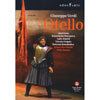Verdi Otello
Cura in impressive voice but there are only glimpses of that promised Otello
View record and artist detailsRecord and Artist Details
Composer or Director: Giuseppe Verdi
Genre:
Opera
Label: Opus Arte
Magazine Review Date: 4/2007
Media Format: Digital Versatile Disc
Media Runtime: 0
Mastering:
Stereo
Catalogue Number: OA0963D

Tracks:
| Composition | Artist Credit |
|---|---|
| Otello |
Giuseppe Verdi, Composer
Antoni Ros Marbà, Conductor Francisco Santiago, Montano, Bass Giorgio Giuseppini, Lodovico, Bass Giuseppe Verdi, Composer José Cura, Otello, Tenor Ketevan Kemoklidze, Emilia, Mezzo soprano Krassimira Stoyanova, Desdemona, Soprano Lado Ataneli, Iago, Baritone Liceu Grand Theatre Chorus Liceu Grand Theatre Symphony Orchestra Roberto Accurso, Herald, Bass Vincenç Esteve, Roderigo, Tenor Vittorio Grigolo, Cassio, Tenor |
Author: John Steane
There is great cheering in the Liceu at the close of this Otello and particularly for the Otello himself. But “Oh, the pity of it, Iago”. There was a time when it seemed possible that in José Cura we would have the Otello of this decade: the voice, the stage presence and something of the feeling for the tragedy were his, together with a lot that needed refining and good direction. What we see and hear now reminds us sufficiently often of that hope to make “the pity of it” a still more lamentable presence. The voice is still impressive and like no other to be heard today; but the tone is unresponsive to the emotions and the subtler developments, some of the great passages (“Ora e per sempre addio”, “Si, pel ciel”, “Ma, o pianto, o duol”) are indecently hurried, and the start of the love duet is repeatedly flat. And the direction he is under in this production (if, indeed, it and not he is responsible for the more pretentious fatuities) is anything but good.
The Iago, however, is more than adequate, and the Desdemona is admirable. Krassimira Stoyanova sings beautifully, with pure, steady tone and fine gradations of volume, and is dignified, if not especially moving, in her acting. The Cassio of Vittorio Grigolo is graceful, if implausibly ready to respond to Iago’s suggestions in the handkerchief scene. The chorus sings well but is produced with a woeful lack of interest. That – the producer’s interest – centres on a cross; the symbolic potential is fearfully glimpsed from the start but fulfilled with scarcely imaginable persistence. Another feature of the production is that the first two acts are run together without a break, likewise Acts 3 and 4, so that in the absence of a bed Desdemona has to sleep on the floor – on the cross of course.
The Iago, however, is more than adequate, and the Desdemona is admirable. Krassimira Stoyanova sings beautifully, with pure, steady tone and fine gradations of volume, and is dignified, if not especially moving, in her acting. The Cassio of Vittorio Grigolo is graceful, if implausibly ready to respond to Iago’s suggestions in the handkerchief scene. The chorus sings well but is produced with a woeful lack of interest. That – the producer’s interest – centres on a cross; the symbolic potential is fearfully glimpsed from the start but fulfilled with scarcely imaginable persistence. Another feature of the production is that the first two acts are run together without a break, likewise Acts 3 and 4, so that in the absence of a bed Desdemona has to sleep on the floor – on the cross of course.
Discover the world's largest classical music catalogue with Presto Music.

Gramophone Digital Club
- Digital Edition
- Digital Archive
- Reviews Database
- Full website access
From £8.75 / month
Subscribe
Gramophone Full Club
- Print Edition
- Digital Edition
- Digital Archive
- Reviews Database
- Full website access
From £11.00 / month
Subscribe
If you are a library, university or other organisation that would be interested in an institutional subscription to Gramophone please click here for further information.




